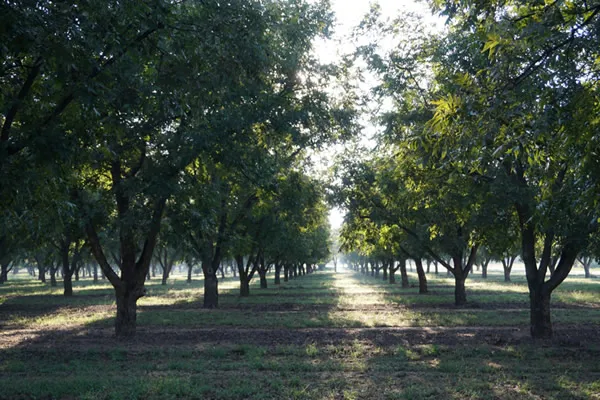Pecans are the only major tree nut that is truly native to the United States. In fact, the word “pecan” is derived from a Native American word of Algonquin origin that means “a nut too hard to crack by hand.” With 10 mg per ounce, pecans contain phytonutrients, specifically flavonoids, at levels comparable to some superfruits.
Today, consumers are increasingly interested in the origin, production and quality of their foods, creating a shift in how products are assessed and valued. American pecans meet the growing demand as they possess a strong heritage along with qualities of a superfood of the future.
“Pecans are one of the few indigenous plants to have evolved into a highly coveted and internationally traded crop, with American growers producing over 80% of the world’s pecan supply.” - American Pecan Council.

The Native Nut in Texas
According to the American Pecan Council, the United States produces more than 300 million pounds of pecans annually. Pecans are primarily grown in 15 U.S. states, with the native range stretching from Texas into Southwestern Ohio and parts of Kentucky and Alabama.
The widespread growth of pecans in America can be followed back to the Native American peoples, like the Karankawa, who collected kernels during the fall months, traded the nuts between nations, and relied on these nuts as a food source as they migrated along Central Texas rivers. Texas pecans were the first to be introduced to the wider world. According to the book Pecan: America’s Native Nut Tree, Spanish conquistador Cabeza de Vaca was the first European to encounter pecans after being ship-wrecked near Galveston in 1528.
Today, pecans are a native agricultural resource in more than 150 of the 254 Texas counties. In fact, Texas continually ranks within the top three pecan producing states — harvesting an average annual crop of about 60 million pounds. An impressive number considering that many pecans come from families who have passed down the traditions of the trade for multiple generations.
Food Trends and the Future of Pecans
With plant-based and plant-forward diets gaining traction, pecans are bound to have a bigger presence in everyday diets. Packed with multiple health-promoting nutrients and bioactive compounds, pecans are a true nutrition powerhouse. They are a valuable plant protein source that is cholesterol-free, gluten-free and naturally sodium-free. Next to their nutritional value, pecans are super versatile, pairing with a wide range of flavors and incorporated nicely into a variety of culinary creations.
“From a culinary perspective, pecans have a taste and texture unlike any other nut, which gives them the ability to shine, in a multitude of applications and both a professional (chefs and food manufacturers) and the consumer kitchen.” - Diane Welland, MS, RD, the Communications Manager for the National Pecan Shellers Association.
On their own, pecans are known to have a naturally sweet and rich, buttery taste.

Like most nuts, they are available shelled and unshelled. When distributed, Texas pecans are usually shelled, allowing them to be directly enjoyed by consumers once purchased. It is worth noting, that the pecan industry is seeing some developments towards and a demand for pecan-based products, such as pecan butter, flour, oil and milk. These products are particularly relevant for consumers looking for plant-based alternatives or with certain dietary restrictions, such as with gluten intolerance. The pecan can be transformed into many different forms and easily added to any part of the diet. Whether savory, sweet, crunchy, buttery or smooth, pecans are great for traditional dishes and everyday meals as well as innovative recipes.
Packed with plenty of health benefits, Texas pecans have been described as a superfood. America’s native nut not only possesses a nutritional value and a beloved taste, but also a storied history that has shaped the pecan to what it is today. Through their strong roots and generations of growers, Texas pecans are not only a staple in the south, but a valued nut enjoyed around the world.
Are you an importer or business looking for Texas Pecans in Europe? Feel free to reach out to Phaff Export Marketing, the European in-market consultant for the Texas Department of Agriculture.
For more information:
Phaff
Tel: +31(0)36 760 7100
Email: pem@phaff.com
